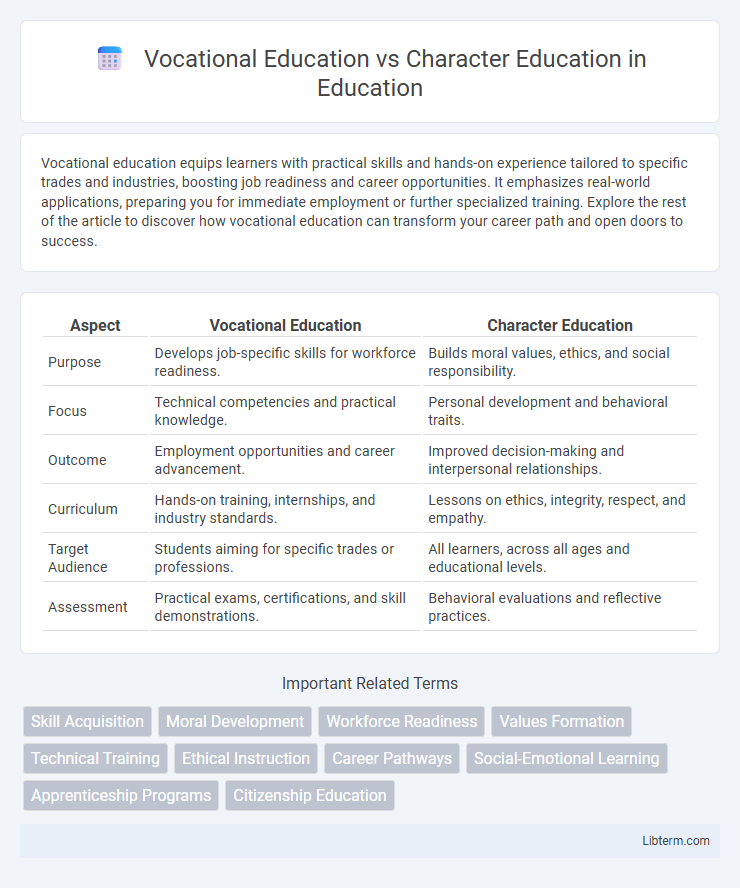Vocational education equips learners with practical skills and hands-on experience tailored to specific trades and industries, boosting job readiness and career opportunities. It emphasizes real-world applications, preparing you for immediate employment or further specialized training. Explore the rest of the article to discover how vocational education can transform your career path and open doors to success.
Table of Comparison
| Aspect | Vocational Education | Character Education |
|---|---|---|
| Purpose | Develops job-specific skills for workforce readiness. | Builds moral values, ethics, and social responsibility. |
| Focus | Technical competencies and practical knowledge. | Personal development and behavioral traits. |
| Outcome | Employment opportunities and career advancement. | Improved decision-making and interpersonal relationships. |
| Curriculum | Hands-on training, internships, and industry standards. | Lessons on ethics, integrity, respect, and empathy. |
| Target Audience | Students aiming for specific trades or professions. | All learners, across all ages and educational levels. |
| Assessment | Practical exams, certifications, and skill demonstrations. | Behavioral evaluations and reflective practices. |
Defining Vocational Education
Vocational education refers to training programs designed to equip individuals with specific skills and knowledge for particular trades or careers, such as carpentry, nursing, or information technology. It emphasizes hands-on experience and practical application to prepare students directly for the workforce. Unlike character education, which focuses on developing moral values and personal virtues, vocational education prioritizes technical proficiency and job readiness.
Understanding Character Education
Character education emphasizes the development of ethical values, social responsibility, and emotional intelligence, fostering well-rounded individuals capable of making positive contributions to society. It focuses on cultivating traits such as integrity, empathy, and resilience, which support personal growth and interpersonal relationships. By prioritizing moral reasoning and civic engagement, character education complements vocational training, equipping students with essential life skills beyond technical expertise.
Core Objectives of Vocational Training
Vocational education primarily targets skill development for specific trades or professions, emphasizing practical expertise and job readiness to enhance employability in industries such as manufacturing, healthcare, and technology. Core objectives include imparting hands-on training, technical knowledge, and workplace competencies to equip learners with industry-relevant abilities. In contrast, character education centers on cultivating ethical values, social responsibility, and personal development to foster integrity and citizenship.
Goals of Character Development Programs
Character development programs primarily aim to instill core values such as integrity, responsibility, and empathy, fostering ethical behavior and social-emotional growth in individuals. These programs emphasize cultivating self-discipline, resilience, and respect, which are essential for personal and professional success. Unlike vocational education, which centers on specific skill acquisition for career readiness, character education focuses on shaping holistic personality traits and moral judgment.
Skills Acquired Through Vocational Education
Vocational education emphasizes practical skills such as technical proficiency, problem-solving, and industry-specific knowledge essential for immediate workforce entry. It provides hands-on training in fields like healthcare, engineering, and information technology, equipping students with competencies directly aligned with labor market demands. This approach enhances employability by fostering job-ready skills and adapting to evolving economic needs.
Values Instilled by Character Education
Character education instills core values such as integrity, responsibility, empathy, and perseverance, fostering ethical decision-making and social awareness in students. These values enhance personal development and community engagement, creating well-rounded individuals beyond technical skills. In contrast to vocational education's focus on job-specific competencies, character education cultivates moral principles essential for lifelong success and leadership.
Impact on Employability and Career Readiness
Vocational education provides students with specific technical skills and hands-on experience directly aligned with job market demands, significantly enhancing employability and career readiness in specialized fields. Character education fosters essential soft skills such as communication, teamwork, and ethical decision-making, which are critical for long-term career success and adaptability in diverse professional environments. Integrating both approaches creates a well-rounded workforce equipped with practical expertise and interpersonal competencies, maximizing employment potential and career growth opportunities.
Influence on Personal Growth and Ethics
Vocational education enhances personal growth by developing practical skills and fostering responsibility through hands-on learning experiences, directly preparing individuals for specific careers. Character education shapes ethics by promoting values such as integrity, empathy, and accountability, which are essential for personal decision-making and social interactions. Together, these educational approaches contribute to a balanced development of competence and moral character, equipping individuals for both professional success and ethical leadership.
Integrating Vocational and Character Education
Integrating vocational education with character education enhances students' practical skills alongside core ethical values such as responsibility, integrity, and teamwork, which are essential in the workplace. This approach fosters holistic development by preparing learners not only for specific careers but also for meaningful social contributions and personal growth. Combining these educational frameworks results in a workforce that is both competent and morally grounded, improving employability and societal impact.
Future Trends in Education Models
Future trends in education models emphasize a blended approach integrating vocational education with character education to equip students with both practical skills and ethical frameworks. Emerging technologies like AI and immersive simulations enhance hands-on learning experiences while fostering critical thinking, empathy, and resilience. Educational institutions increasingly adopt personalized, competency-based curricula that balance technical proficiency with character development to prepare learners for dynamic workforce demands and societal challenges.
Vocational Education Infographic

 libterm.com
libterm.com